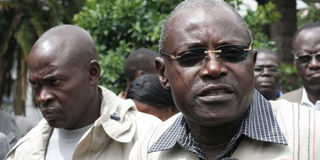Petitioners want legal centre CEO Kulundu removed from office

Council of Legal Education Chief Executive Officer Professor Kulundu Bitonye (right). FILE PHOTO | NATION MEDIA GROUP
What you need to know:
- Two petitioners Anunda Marendi and Vincent Yegon argue that Prof Kulundu was irregularly appointed as the Secretary to the Council and further that in the year 2006 he was promoted to the position of chief executive officer.
- The petitioners also claim that there have been formal reports of financial improprieties and general mismanagement at the council.
- They want the position declared vacancy and a forensic and specialized audit of the accounts and management aspects of the council to be done.
A petition seeking the removal of Council of Legal Education Chief Executive Officer Prof Kulundu Bitonye has been filed at the National Assembly.
Speaker of the National Assembly Justin Muturi read the petition to Members of Parliament on Thursday and directed the Committee on Justice and Legal Affair chaired by Samuel Chepkonga to take up the matter and report back.
“The Committee is required to consider the Petition and report its findings in accordance with the provision of Standing Order 227 (2),” said Mr Muturi.
Two petitioners Anunda Marendi and Vincent Yegon who say they have filed the petition on behalf of the entire legal profession within the Republic of Kenya argue that Prof Kulundu is illegally occupying the office.
“The Petitioners state inter alia, that, sometime in 2014, the said Prof Wanjala Kulundu Bitonye was irregularly appointed as the Secretary to the Council and further that in the year 2006 he was promoted to the position of Chief Executive Officer,” reads the petition.
MANDATORY RETIREMENT AGE
It goes on, “The Petitioners contend that, as if this not sufficient abuse of public polices, the Council has also allowed the said officer to continue occupying the office of chief executive officer way beyond the mandatory retirement age obtaining in public service.”
Prof Bitonye was born in 1952.
The petitioners also claim that there have been formal reports of financial improprieties and general mismanagement at the council including those contained in a recent report prepared by Efficiency Monitoring Unit which lays heaviest responsibility on the person of the current Chief Executive Officer and whose examination has been inordinately delayed.
They want the position declared vacancy and a forensic and specialized audit of the accounts and management aspects of the council to be done.
Several attempts have been made to eject Prof Bitonye but he has rejected them, insisting the new CLE amendments passed by Parliament, which capped CLE tenure to three years from the previous four, does not affect the current body.
In June this year, President Uhuru Kenyatta appointed Nzamba Gitonga as the Council ending row between the council board and State House over its tenure.
Mr Gitonga replaced Fred Ojiambo who had served since 2013.
SOLVED AMICABLY
At the same time, Law Society of Kenya has expressed confidence the issue of Kenya School of Law locking out students from East Africa Community from pursuing their post graduate studies at the school will be solved amicably.
LSK president Isaac Okero said he had discussed the matter with Attorney General Prof Githu Muigai and who had sought more time to discuss the issue with his counterpart in Uganda.
“I assure you that Kenya and the law society of Kenya remain in full support of the spirit of integration with regards to the movement of legal service and of the provision of the mutual recognition agreement,” said Mr Okero in a letter to Uganda Law Society President Francis Gimara dated November 29.
Counties that are affected by the ban that takes effect next month include; Uganda, Tanzania, Burundi and Rwanda.
Prof Bitonye said the decision had been arrived at after it was noted that there has been an error in the procedure of admitting foreign nationals to the school.
He said the issue was discussed at the taskforce on legal sector reforms convened by the office of the Attorney General at and department of Justice.
“Kenya law school should not admit any foreign candidates from the other East Africa Community member states to the advocates training programme for qualifying as advocates candidates for automatic admission to the roll of advocates in Kenya under section 12 and 13 of the advocates Act, cap 16 of the laws of Kenya unless such persons have been similarly admitted as advocates in their respective countries or origin,” adds Prof Bitonye letter to KSL.
DULY QUALIFIED PERSONS
Section 12 of the Kenya school of law Act 2012 states that no person shall be admitted as an advocate unless he is a citizen of Kenya, Rwanda, Burundi, Uganda or Tanzania and he is duly qualified while section 13 states that a person shall be duly qualified if – having passed the relevant examinations of any recognized university in Kenya, he holds or has become eligible for the conferment of a degree in law of that university.
Or having passed the relevant examinations of university, University College or other institutions as the council of legal education may from time to time approve
It further provides that the candidate should be an advocate of the High Court for the time being in Uganda, Rwanda, Burundi and Tanzania.
“Please note that the council shall not henceforth gazette any person who does not meet the aforementioned criteria for purposes of admission to the roll. It is expected that going forward the school shall apply these admission criteria starting with the January 2017/2018 intake,” added the CLE boss.





